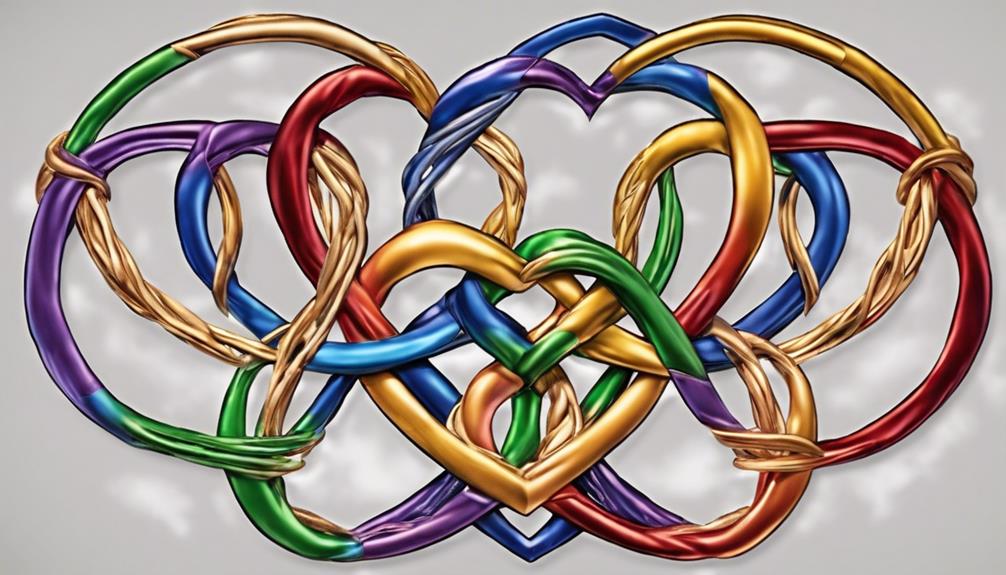When examining the differences between ethical non-monogamy and polyamory, it is important to grasp the intricate dynamics that influence these types of relationships.
While both involve navigating multiple connections, the way in which ethical non-monogamy and polyamory approach boundaries and communication sets them apart significantly.
As we delve into the intricacies of these relationship models, we'll uncover the fundamental principles that underpin each, shedding light on the diverse ways individuals navigate love, commitment, and intimacy in non-traditional relationships.
Key Takeaways
- Polyamory prioritizes romantic love with multiple partners based on emotional connections.
- Polyfidelity involves exclusive commitment within a closed-loop dynamic, resembling monogamy.
- Ethical non-monogamy principles emphasize boundaries, communication, and diverse relationship structures.
- Understanding emotional complexities, managing jealousy, and fostering trust are essential in polyamory and ethical non-monogamy.
Key Definitions in Relationship Dynamics
Understanding the nuances between different relationship dynamics is crucial for navigating the complexities of ethical non-monogamy and polyamory. In the realm of non-monogamous relationships, polyamory stands out for its emphasis on romantic love with multiple partners, going beyond mere sexual openness. This distinction underscores the importance of emotional connections in polyamorous dynamics, setting it apart from other forms of non-monogamy that may prioritize physical intimacy over romantic involvement.
Within the spectrum of non-monogamous relationships, polyfidelity emerges as a unique concept. In polyfidelity, a closed-loop forms among three or more individuals who commit exclusively to each other, refraining from engaging in sexual activities outside the established group. This arrangement resembles monogamy in its exclusivity, highlighting the diverse structures present in ethical non-monogamous relationships.
As individuals explore the boundaries and possibilities within non-monogamous relationships, the definitions of polyamory and polyfidelity offer insights into the varied ways people approach love and commitment in these alternative relationship dynamics.
Ethical Non-Monogamy: Principles and Boundaries
False
Polyamory: Love and Connection Beyond Monogamy
Navigating the intricacies of polyamory involves embracing a multifaceted approach to love and connection beyond traditional monogamous relationships. In polyamorous dynamics, love isn't seen as a finite resource but rather as abundant and expansive. This perspective allows individuals to form deep emotional connections with multiple partners simultaneously, challenging the societal norm of monogamy. The essence of polyamory lies in fostering open communication, trust, and respect among all parties involved to ensure that everyone's needs are met and boundaries are respected.
Polyamory encourages individuals to explore diverse forms of connection, whether it be romantic, emotional, or sexual. This freedom to engage in multiple relationships can lead to a richer, more fulfilling love life where partners support each other in personal growth and self-discovery. By transcending the constraints of monogamy, polyamory offers a unique opportunity to cultivate profound bonds and experience love in its many intricate and beautiful forms.
Communication and Consent in Non-Monogamous Relationships

Embracing honest and open communication is paramount in navigating the complexities of non-monogamous relationships, ensuring that boundaries, needs, and expectations are discussed and respected among all partners involved. When it comes to communication and consent in these relationships, here are three key points to consider:
- Open Dialogue: Engaging in transparent conversations about boundaries, desires, and feelings fosters trust and understanding among partners. This open dialogue allows everyone to express their needs and concerns freely, leading to a more harmonious relationship dynamic.
- Mutual Agreement: Consent is the cornerstone of ethical non-monogamous relationships. All parties involved must actively agree to the relationship structure and dynamics, ensuring that everyone is on the same page and comfortable with the arrangement.
- Continuous Communication: Establishing a foundation of consistent communication and ongoing consent is essential. It helps navigate complex emotions, resolve conflicts, and adapt to changes within the relationship dynamic, ensuring that all individuals feel heard, respected, and valued.
Navigating Jealousy and Emotional Challenges
Understanding and managing feelings of jealousy is a fundamental aspect of fostering healthy dynamics in ethical non-monogamous relationships. Jealousy in non-monogamous setups can often arise from the fear of losing a partner's affection or feeling inadequate compared to others involved.
To address jealousy effectively, open and honest communication is key. It involves delving into personal insecurities, being self-aware, and expressing vulnerabilities to your partners. Validating these feelings of jealousy, rather than suppressing them, can lead to a deeper understanding of oneself and the relationship.
Practicing compersion, which is finding joy in your partner's happiness with others, can help shift jealousy towards positivity. Setting clear boundaries and seeking support from each other can also aid in managing emotional challenges. Working through jealousy not only strengthens the bond between partners but also fosters emotional growth within the ethical non-monogamous dynamic.
Frequently Asked Questions
What Is the Difference Between Poly and Ethical Non-Monogamy?
When differentiating between polyamory and ethical non-monogamy, it's crucial to understand the nuances. In our experience, the distinction lies in the broader scope of ethical non-monogamy, encompassing various consensual non-monogamous relationships beyond just romantic love.
Polyamory, on the other hand, specifically focuses on multiple romantic partnerships. Both emphasize consent, communication, and respect, but ethical non-monogamy allows for a wider range of relationship structures based on individual preferences and agreements with partners.
Why Is Polyamory Ok but Not Polygamy?
We understand the curiosity about why polyamory is more accepted than polygamy in today's society.
It primarily revolves around the emphasis on consent and individual agency in polyamorous relationships, fostering a culture of open communication and mutual respect among all partners.
This ethical foundation ensures that everyone involved willingly agrees to the relationship dynamics, prioritizing the needs and boundaries of each individual.
Is ENM the Same as Swinging?
We've explored the realm of ethical non-monogamy, where various relationship styles coexist.
Swinging, a facet of ENM, often involves casual sexual encounters without deep emotional ties. It differs from polyamory, which emphasizes building intimate, loving connections with multiple partners.
While both swinging and polyamory require consent and communication, the main distinction lies in the depth of emotional involvement. Swinging is akin to a physical exploration, while polyamory nurtures emotional bonds alongside physical connections.
What Is the Difference Between CNM and ENM Relationship?
In differentiating between CNM and ENM relationships, it's crucial to recognize that CNM encompasses a range of non-monogamous setups, while ENM specifically underscores ethical conduct and mutual respect.
Within ENM, like polyamory, the focus is on emotional connections with multiple partners. The key distinction lies in the emphasis on ethical considerations and open communication in ENM, ensuring that all relationships are built on honesty, transparency, and mutual consent.
Conclusion
As we navigate the intricate dance of ethical non-monogamy and polyamory, it's like tending to a garden of diverse flowers. Each relationship is a unique bloom, requiring careful attention, communication, and nurturing to flourish.
Just as different flowers require different care, each non-monogamous dynamic demands understanding, respect, and love. Embracing the beauty of this garden means honoring the individuality of each flower, cultivating a rich tapestry of connections that enrich our lives.









